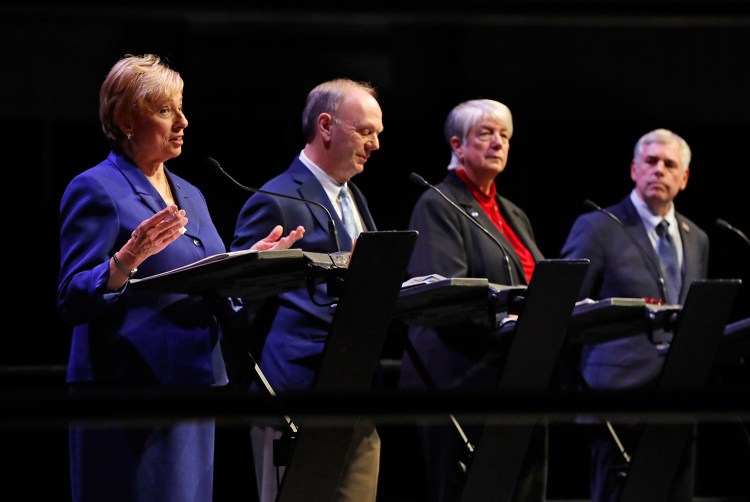AUGUSTA — The four candidates for governor fielded questions about Maine’s economy, workforce shortages, energy prices and other topics Wednesday night during a fast-paced but largely friendly debate in front of business leaders.
The candidates – Democrat Janet Mills, Republican Shawn Moody and independents Alan Caron and Terry Hayes – agreed on many topics, including the need to expand broadband infrastructure, increase teacher pay and their concerns over a senior home-care ballot initiative. They differed, however, on a proposed statewide teacher contract, welfare reforms and how they would pay for ambitious programs during the first televised debate of the gubernatorial race.
The only brief flashpoint of the hour-long debate hosted by News Center Maine (WCSH/WLBZ) and the Maine State Chamber of Commerce came when the candidates were asked about their relationship with the media and whether they would operate a transparent administration. All four pledged to have a more open relationship than Gov. Paul LePage, who has maintained an adversarial, closed-door policy with much of the Maine media and often stonewalled requests for public documents.
“I have an open-door policy, I’ll take the door right off the hinges. How’s that?” said Moody, a Gorham resident who runs a successful chain of auto body repair shops.
That prompted Mills, a Farmington resident who serves as attorney general, to retort that she was still waiting for Moody to release his recent tax returns to the public.
“That could be his first act of transparency,” Mills said.
Moody shot back saying releasing his personal tax returns would expose confidential business information because, like many small-business owners, he combined business and personal tax returns. Then Moody said he at least filed all of his taxes on time, noting Mills didn’t produce a tax return for last year because she had requested an extension.
All four candidates expressed concerns about Question 1 on the November ballot, which would increase taxes on the wealthiest Mainers in order to help pay for home care to the elderly.
Hayes, who is the Maine state treasurer, said the referendum should have gone through the legislative process to allow stakeholders that care for the elderly to help lawmakers fine-tune a proposal that will most benefit senior citizens. Caron, an economic development consultant and business owner from Freeport, said the state lacks resources to address many problems, adding voters should be wary of offers of “apple pie with a scoop of ice cream” paid for by someone else.
“I’m going to be very straight about this: What we need to do is find new revenues and we can only do that by growing the economy and shrinking government,” Caron said.
Oops! We could not locate your form.
On the topic of energy, all four candidates expressed support for expanding renewable energy. The candidates also expressed varying levels of concern about Central Maine Power’s proposal for a 145-mile transmission line cutting through western Maine to deliver electricity from Hydro-Quebec to Massachusetts. While Hayes and Moody indicated they were leaning toward opposing it based on current information, Caron and Mills were more firm in their opposition.
The candidates also differed somewhat on the topics of welfare reform.
Asked by the moderator, Pat Callaghan of News Center Maine, which, if any, LePage welfare reforms she would roll back, Mills replied she would reverse changes that reduced access to Supplemental Nutrition Assistance Program, formerly known as food stamps.
“There’s a hunger problem in the state of Maine,” Mills said, noting that one in five Maine public school children go to school hungry and that more than 50 percent of the public school students are eligible for free/reduced price lunch programs.
Caron said he would find savings in state government to better fund benefit programs, vowing to reduce the size of state government by 10 percent without slashing government services.
Hayes said she too would use the federal money that comes to Maine that is dedicated for helping low-income children and is not being used for those purposes by LePage. She said she would focus on early childhood education programs, child care help for working parents and nutrition programs.
“This isn’t about finding new places for money, this is money we already have that comes to us because of our federal tax dollars,” Hayes said.
Moody did not say which LePage reforms he would reverse, but talked about changing a policy that would allow people on General Assistance to transition to the workforce without losing all of their benefits.
“If we can create that pathway, that mezzanine, so people can get off assistance gradually and get back into the workforce … they are scared to death they are going to lose their benefits,” Moody said.
The 2018 gubernatorial race has been surprisingly low-key to date given that there is no clear front-runner and millions of dollars are being spent on the election.
A debate co-hosted by the Portland Press Herald and the University of New England last week included several lively exchanges between the candidates, most notably between Mills and Moody over climate change. Much of the mudslinging in the campaign has been conducted so far by outside groups and the Democratic and Republican parties airing television ads attacking the two party nominees.
One topic that did not come up during Wednesday’s debate were news reports last week about a 2006 complaint against Moody to the Maine Human Rights Commission from a former employee of Moody’s Collision Center and Auto Body Repair. The employee claimed she was fired because she gave birth and “would no longer be able to do the job,” but the discrimination complaint was eventually withdrawn after the parties settled.
Moody declined last week to discuss the case, citing a non-disclosure agreement, and that he had “always treated every co-worker with dignity and respect, men or women.”
Kevin Miller can be contacted at 791-6312 or at:
kmiller@mainetoday.com
Twitter: KevinMillerPPH
Send questions/comments to the editors.




